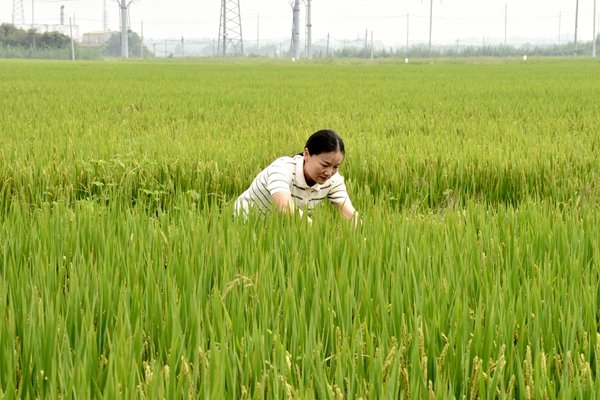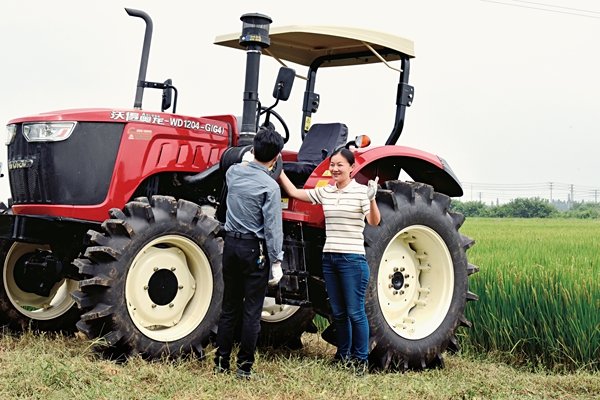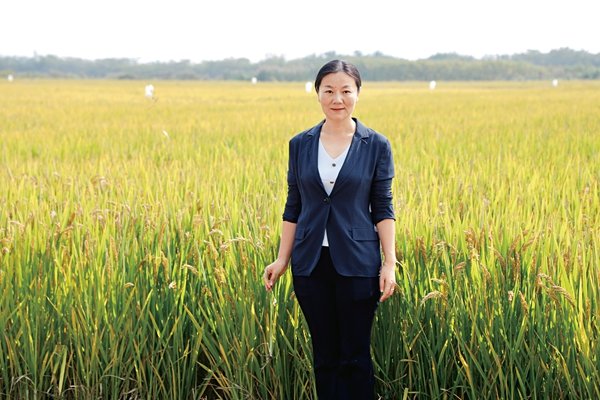Cultivating New Farmers, Developing New Quality Agricultural Productive Forces

Once a researcher with Chinese Academy of Sciences (CAS), Wei Qiao is now known as a tech-savvy "new farmer" in Zhenjiang (her hometown), in East China's Jiangsu Province. "New farmer" is the term commonly used to describe young Chinese who relocate from big cities to the countryside to engage in agricultural activities.
As president of both Yongxing Agricultural Machinery Mechanization Professional Cooperative and Jiangsu Runguo Agricultural Development Co., Ltd., Wei has been contributing — with advanced ideas and modern entrepreneurial skills — to the rural revitalization of her hometown.
Wei is also a deputy to the 14th NPC. At a deliberation in which President Xi Jinping participated during the first session of the 14th NPC in March 2023, Wei got a chance to share with the president her latest achievements as a farmer in the digital age.
"We have cultivated more than 20,000 mu (about 1,333 hectares) of rice, with each mu yielding 550 kilograms of grain," Wei said. By using digital methods to manage the fields, work efficiency has been greatly improved, she added.
Xi commended Wei's efforts, saying "20,000-plus mu is no small number in South China." He went on to say that such an area is sufficient to unleash the potential of farm machinery and develop modern protected agriculture.
By recalling Xi's words, Wei has been able to gain a deeper understanding of rural revitalization. "To encourage new farmers to move to the front line of rural revitalization, I think the most important thing is to develop agricultural industries well, thus attracting and retaining talents through prosperous industries," Wei says. "The mission of new farmers is to explore a high-quality agricultural development path suitable for China's national conditions, and to develop new quality productive forces according to local conditions."

Leading New Farmers in Contributing to Rural Revitalization
In 2017, Wei and her husband, Sun Zhenzhong, quit their jobs with CAS and Peking University, respectively. They returned to Zhenjiang to realize their "agricultural dream."
Wei understands it is necessary to cultivate high-quality new farmers to achieve sustainable development of the agricultural industry. During this year's NPC session, Wei proposed supporting construction of high-quality agricultural development pilot zones for new farmers. She emphasized the need to attract capable and knowledgeable young people to the front line of rural revitalization.
Wang Xuchun, who was born in the 1990s, began working at Yongxing Cooperative in 2018. Under Wei's guidance, and through his own efforts, Wang worked his way up to vice-president of the cooperative. "The average age of our team is 32. Since Wei was commended by President Xi, we have been excited. We firmly believe new farmers have great potential in the vast fields. Working in rural areas is a very meaningful thing. What impresses me most is seeing the towering mountains of grain, and the joy on the faces of farmers after each harvest," says Wang.
In 2022, Jiangsu University hired Wei, as an industrial professor, to help cultivate new farmers. Jiangsu Agriculture and Forestry Vocational and Technical College established Yafu New Farmers College in December 2023. Wei was asked to be dean of the college.

Developing Digital Agriculture
From strengthening revitalization of the seed industry, and enhancing research and development of key agricultural technologies, to boosting scientific and technological innovation in agricultural machinery and equipment, the new quality productive forces are advancing the innovation and upgrading of traditional agriculture.
On April 8, Wei gave a lecture — on advancing rural revitalization and empowering digital agriculture with new quality productive forces — during an exchange activity at her company. More than 20 grassroots Party members, and representatives of various towns and villages in Zhenjiang's Economic and Technological Development Zone, attended.
Based on her own experiences in modern digital agriculture, Wei talked about the national policy of building a strong agricultural country, from multiple aspects, such as the main tasks of rural revitalization work this year, and the focus of developing new quality agricultural productive forces.
Wu Qian returned to her hometown to work after she graduated from university. Although she has been engaged in grassroots publicity work for many years, she still lacks in-depth understanding of the development of digital agriculture. After hearing Wei's lecture, Wu said she was proud to have large-scale, digital-agricultural enterprises, like Runguo, in her hometown.
"We have built a smart agricultural technology network in our farmland, and we are empowering agricultural production with science and technology. The land plots are digitized and numbered, and the soil fertility of each plot is closely monitored to accurately control fertilizer application. We rely on digitization and mechanization to achieve whole-process digital monitoring from soil, water sources, and meteorology to disease and pest control, ensuring the traceability of rice throughout the entire process," Wei says.
With the digitization of agriculture, labor intensity has been reduced 40 percent, the fertilizer utilization rate has been increased 15 percent, pesticide use has been reduced 20 percent, yield per mu has been increased 9 percent, the average profit per mu has been increased 28 percent, and more than 10,000 farmers have increased their incomes through technological upgrades, Wei notes.
"We will continue to promote the building of digital eco-farms, and we will lead more new farmers to join the development of modern agriculture and dedicate themselves to rural revitalization." Wei says.
Photos from Interviewee
(Women of China English Monthly May 2024)
Editor: Wang Shasha
Please understand that womenofchina.cn,a non-profit, information-communication website, cannot reach every writer before using articles and images. For copyright issues, please contact us by emailing: website@womenofchina.cn. The articles published and opinions expressed on this website represent the opinions of writers and are not necessarily shared by womenofchina.cn.








.jpg)

 WeChat
WeChat Weibo
Weibo 京公网安备 11010102004314号
京公网安备 11010102004314号